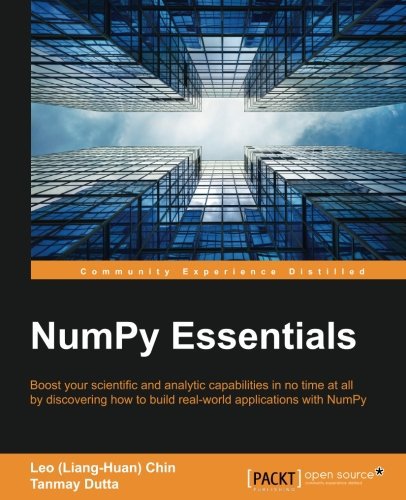

Most ebook files are in PDF format, so you can easily read them using various software such as Foxit Reader or directly on the Google Chrome browser.
Some ebook files are released by publishers in other formats such as .awz, .mobi, .epub, .fb2, etc. You may need to install specific software to read these formats on mobile/PC, such as Calibre.
Please read the tutorial at this link: https://ebookbell.com/faq
We offer FREE conversion to the popular formats you request; however, this may take some time. Therefore, right after payment, please email us, and we will try to provide the service as quickly as possible.
For some exceptional file formats or broken links (if any), please refrain from opening any disputes. Instead, email us first, and we will try to assist within a maximum of 6 hours.
EbookBell Team

4.7
106 reviewsIn today’s world of science and technology, it’s all about speed and flexibility. When it comes to scientific computing, NumPy tops the list. NumPy gives you both the speed and high productivity you need.
This book will walk you through NumPy using clear, step-by-step examples and just the right amount of theory. We will guide you through wider applications of NumPy in scientific computing and will then focus on the fundamentals of NumPy, including array objects, functions, and matrices, each of them explained with practical examples.
You will then learn about different NumPy modules while performing mathematical operations such as calculating the Fourier Transform; solving linear systems of equations, interpolation, extrapolation, regression, and curve fitting; and evaluating integrals and derivatives. We will also introduce you to using Cython with NumPy arrays and writing extension modules for NumPy code using the C API. This book will give you exposure to the vast NumPy library and help you build efficient, high-speed programs using a wide range of mathematical features.
Leo (Liang-Huan) Chin is a data engineer with more than 5 years of experience in the field of Python. He works for Gogoro smart scooter, Taiwan, where his job entails discovering new and interesting biking patterns . His previous work experience includes ESRI, California, USA, which focused on spatial-temporal data mining. He loves data, analytics, and the stories behind data and analytics. He received an MA degree of GIS in geography from State University of New York, Buffalo. When Leo isn't glued to a computer screen, he spends time on photography, traveling, and exploring some awesome restaurants across the world. You can reach Leo at http://chinleock.github.io/portfolio/.
Tanmay Dutta is a seasoned programmer with expertise in programming languages such as Python, Erlang, C++, Haskell, and F#. He has extensive experience in developing numerical libraries and frameworks for investment banking businesses. He was also instrumental in the design and development of a risk framework in Python (pandas, NumPy, and Django) for a wealth fund in Singapore. Tanmay has a master's degree in financial engineering from Nanyang Technological University, Singapore, and a certification in computational finance from Tepper Business School, Carnegie Mellon University.
**